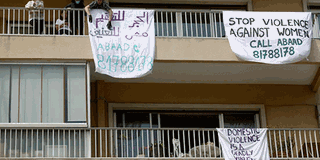Women urge State to prioritise GBV in Covid-19 response

Banners hang from the balconies of a building, with messages against domestic violence, in Beirut, on April 16, 2020. The number of abuse cases has risen globally during the Covid-19 pandemic that obliges women to confine themselves under lockdown with their abusers. PHOTO | AFP
Women rights organizations have appealed to the government to set aside at least 30 per cent of the Covid-19 emergency response fund to address gender-based violence prevention and response strategy in the country.
In a statement on Monday, the civil rights group raise concerns that the pandemic has magnified the structural violence and inequalities that the most vulnerable, including women, youth and children and Persons living with Disability continue to endure even in normal circumstances.
“This has further played out in the development of relevant responses by the government where the voice of civil society has been left to the periphery, and the allocation of resources has had little regard for addressing violence against women and girls,” the statement reads in part.
Violence trigger
Over the past month, the government has enforced measures to reduce movement within the country, including the dusk to dawn curfew to control coronavirus spread. The pandemic has so far killed 14 people and infected another 363.
Although the measures are intended for the good of all, the women’s group note that the government needs to factor in the unique and practical needs of diverse groups of women and girls, and the realities under which they live and operate.
“We particularly note that these measures have compounded and exacerbated the triggers of violence including socio-economic challenges and other inequalities resulting to significant rise in incidences of rape, defilement and domestic violence; increase in intimate partner violence,” the statement further reads.
Worrying reports
Various reports have indicated that the rate of gender-based violence (GBV) have increased in the past two months, with 115 cases reported to the GBV hotline in the month of March compared to 86 cases in February.
Similarly, reports by the National Council on the Administration of Justice (NCAJ) show that cases of rape have also increased significantly in the two weeks following the national curfew, consisting of 35.8 per cent of all reported crimes.
The represented women’s groups, who included the Centre for Rights Education and Awareness, FIDA-Kenya, Coalition on Violence against Women, Equality Now, GROOTS Kenya, SDGs Forum Kenya and the Kenya Female Advisory Organisation, noted that the inability and reduced access to income, loss of jobs and livelihoods, have provided a fertile ground for GBV to thrive.
Curfew measures
The limited access to service providers such as health facilities, police stations and access to courts due to social distancing and curfew measures, have further hampered redress to victims of abuse.
“The stay at home directive is a good one for prevention and containment of the spread of the coronavirus. However, the directive has been applied without cognisance of existing risks to vulnerable groups who face restricted movement and thereby exposing them to violence, inequalities and stifled the voices of those exposed to violence and abuse,” the statement reads.
To mitigate further incidences, the civil rights group want government agencies to set up shelter and safe houses for the affected, provide psychosocial and legal aid, medical care and treatment, as well as avail more targeted messaging for vulnerable population.
“We call upon the Ministry of Gender to continue putting women and girls at the centre of their efforts, come up with comprehensive interventions towards prevention, response and accountability on violence against women and girls in a coherent, visible and definite manner,” the represented groups state.





